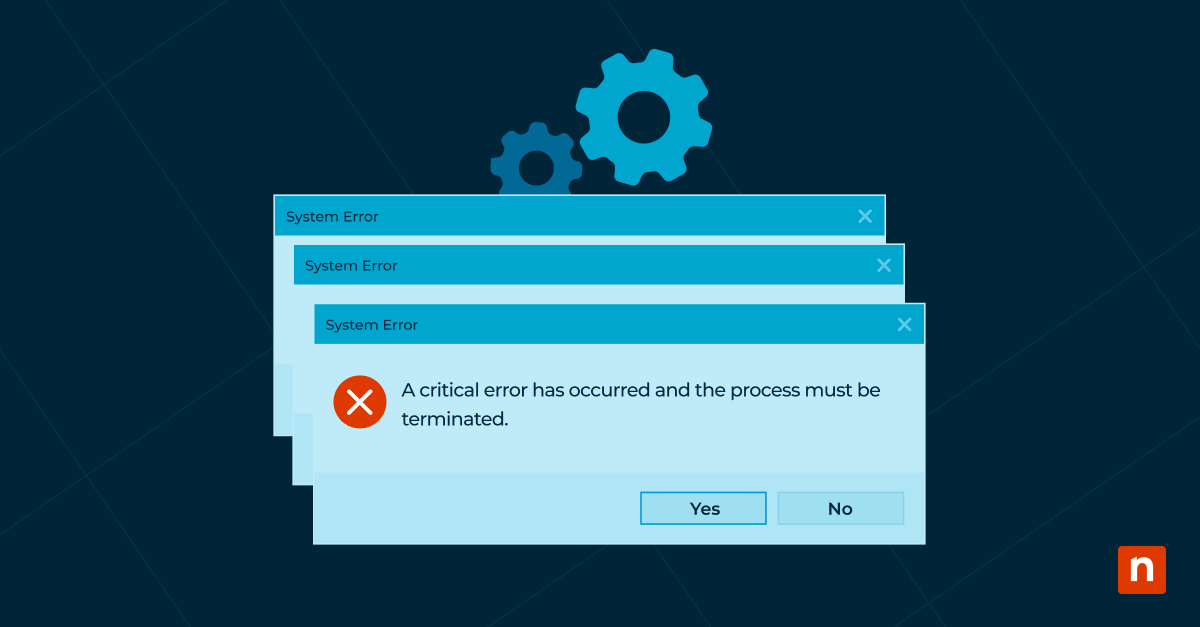As you consider a career in IT service management, you might be wondering, “What is ITIL certification? And is it worth pursuing?” Understanding ITIL certification and its potential benefits can be worthwhile for your professional development.
What is the ITIL certification?
ITIL, which stands for Information Technology Infrastructure Library, is a set of detailed practices for IT service management (ITSM) that focuses on aligning IT services with the needs of businesses and customers.
When you obtain an ITIL certification, you’re proving your proficiency in IT service management best practices. This globally recognized certification can open doors to new opportunities and enhance your credibility in the IT industry. Whether you’re just starting out or aiming for advancement, an ITIL certification can enhance your expertise and potentially boost your career prospects in IT service management.
Encourage IT education and certifications in your team with insights from the NinjaOne team.
Watch this video or join the “Like a Ninja” livestreams.
Levels of ITIL certification
As you consider pursuing ITIL certification, you should evaluate the different ITIL levels available. ITIL 4 is the latest version of ITIL and includes five levels or designations. Each level builds upon the knowledge gained in the previous one, allowing you to progressively deepen your expertise. Here’s what ITIL certification entails at various levels:
ITIL Foundation
This entry-level certification covers the basics of ITIL 4. You’ll learn about creating valuable products and services, basic ITIL 4 principles, the four dimensions of service management, and key concepts of Lean, Agile, and DevOps. The course typically takes two and a half days, with a one-hour exam consisting of 40 multiple choice questions.
ITIL Practice Manager (PM)
The PM certification offers practice-based modules for a flexible training schedule. It’s designed for those wanting to validate skills in specific ITIL 4 management practices.
To earn this certification, you’ll need to complete five individual practices and the ITIL Specialist: Create, Deliver, and Support module. Practices include:
- Service Desk
- Incident Management
- Problem Management
- Service Request Management
- Monitoring and Event Management
ITIL Managing Professional (MP)
This certification is for IT practitioners working with technology and digital teams across an organization. It covers the knowledge necessary for running IT projects, teams, and workflows.
To complete the ITIL MP certification, you’ll need to pass four modules:
- ITIL Specialist Create Deliver & Support
- ITIL Specialist Drive Stakeholder Value
- ITIL Specialist High Velocity IT
- ITIL Strategist Direct Plan & Improve
ITIL Strategic Leader (SL)
The SL certification focuses on how IT influences and informs business strategy, covering all digitally enabled services in an organization. To earn this certification, you’ll need to pass two modules: ITIL Strategist Direct Plan & Improve and ITIL Leader Digital & IT Strategy.
ITIL Master
The pinnacle of ITIL certification, the Master level, requires at least five years of experience in ITSM at a leadership, management or advisory level. There’s no fixed syllabus; instead, you’ll be tested on a situation of your choosing, demonstrating how you’ve applied ITIL principles to achieve business outcomes in complex, real-world scenarios.
ITIL certification requirements
If you’re wondering how to get an ITIL certification, you don’t need any specific prerequisites for the Foundation level. However, as you progress through the levels, you’ll need to meet certain ITIL certification requirements:
- Complete the previous level of certification.
- Attend accredited training courses or self-study using approved materials.
- Pass the corresponding exam for each level.
- Accumulate the required number of credits for higher levels.
- Gain practical experience in implementing ITIL practices (especially for higher levels).
Remember, the road to ITIL mastery is gradual and you’ll need to invest time, effort and potentially financial resources to progress through the levels.
Benefits of ITIL certification
As you consider whether to pursue ITIL certification, it’s important to consider the potential benefits it can bring to your career and your organization. These benefits can help you answer the question, “Is the ITIL certification worth it?”
Improved service delivery
With ITIL certification, you’ll be equipped to enhance IT service delivery within your organization. You’ll learn how to:
- Align IT services with business needs.
- Improve customer satisfaction through better service quality.
- Implement efficient incident management processes.
- Reduce downtime and service disruptions.
Enhanced career prospects
ITIL certification can significantly boost your career prospects. You may find:
- Increased job opportunities, as many employers prefer or require ITIL certification.
- Higher earning potential, with certified professionals often commanding better salaries.
- Greater job security, as your specialized knowledge becomes increasingly valuable.
- Opportunities for career advancement into management or leadership roles.
Increased efficiency and productivity
ITIL practices are designed to streamline IT processes and increase overall efficiency. With certification, you’ll be able to:
- Implement standardized processes that reduce errors and inconsistencies.
- Improve resource allocation and reduce waste.
- Enhance communication between IT and other business units.
- Identify and eliminate bottlenecks in IT service delivery.
Better alignment with business goals
One of the key principles of ITIL is aligning IT services with business objectives. Through certification, you’ll learn how to:
- Translate business needs into IT requirements.
- Demonstrate the value of IT to stakeholders.
- Improve decision-making processes in IT investments.
- Enhance strategic planning for IT services.
Comparing ITIL certification with other IT certifications
As you evaluate what ITIL certification is and its value, you might wonder how it compares to other IT certifications. While ITIL focuses specifically on IT service management, other certifications cover different aspects of the IT landscape. For instance, the Project Management Professional (PMP) certification emphasizes project management methodologies, which can be applied across various industries including IT.
For those interested in auditing and control, the Certified Information Systems Auditor (CISA) provides a deep dive into IT auditing processes. Meanwhile, professionals looking to understand the broader picture of IT in business might consider the Certified in the Governance of Enterprise IT (CGEIT), which emphasizes IT governance and strategic alignment.
The ITIL certification isn’t mutually exclusive with these other certifications. In fact, it often complements them, providing a comprehensive view of IT service management that can enhance your expertise in other areas. Depending on your career goals, you might find value in pursuing ITIL alongside other certifications to create a well-rounded skill set. This combination can make you a versatile IT professional, capable of comprehending and managing various aspects of IT operations and strategy.
Upskill your team. Upgrade your organization. Join the “Like a Ninja” livestreams.
Is the ITIL certification worth it?
After considering all aspects of ITIL certification, you might still be wondering, “Is the ITIL certification worth it?” The answer depends on your individual circumstances and career goals, but here are some factors to consider:
- Your current role and career aspirations: If you’re working in or aiming for a role in IT service management, ITIL certification can be highly beneficial.
- Your organization’s needs: If your company uses or plans to implement ITIL practices, certification can make you a valuable asset.
- Industry trends: ITIL remains a widely recognized framework in the IT industry, and certification can enhance your marketability.
- Personal development: Even if not immediately applicable, the knowledge gained through ITIL certification can broaden your knowledge of IT service management.
- Return on investment: Consider the potential for career advancement and salary increases against the cost and time required for certification.
ITIL certification provides a structured approach to IT service management that is valued by many organizations worldwide. With the right preparation and clear objectives, ITIL certification can be a valuable asset in your IT career.








